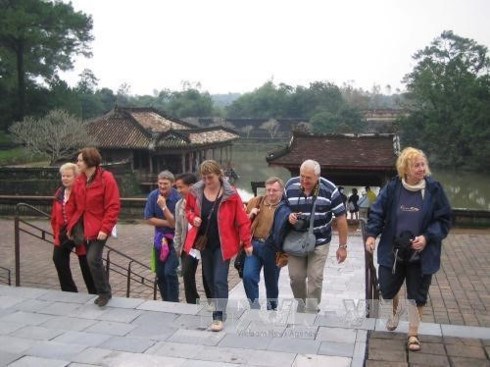A number of royal activities under the Nguyen dynasty (1802-1945) will be held such as ‘bai vu’ – a folk game often played on the full moon night or in the first day of the year to find good luck, ‘xam huong’ (players throw dices to take slabs carved with red Chinese characters in corresponding to degrees of a former examination system), poetry response, and calligraphy.
    |
 |
|
Foreign visitors at the Hue imperial relic site |
The illumination of ‘Ky dai Hue’ (Flag Tower) and the experience of paintball game, which were opened to visitors from February 12 night, were definitely a highlight of the Tet celebration at the imperial relic site.
Earlier, the center re-enacted a ceremony to plant a Neu pole at the citadel on February 8 and held various royal rituals in addition to art and culture activities such as wrapping Chung cake (a traditional cake made from glutinous rice dedicated to Lunar New Year), music performances, calligraphy, and folk games.
The ancient imperial city of Hue in the central province of Thua Thien-Hue was recognized as an ASEAN Clean Tourist City at the ASEAN Travel Forum and Travex International Tourism Trade Fair in Thailand at the end of January.
In 2018, Thua Thien-Hue strives to welcome about 4-4.2 million tourists, a year-on-year rise of 10 percent, with 40-45 percent being international vacationers. Tourism revenues are projected to increase 15 percent to reach VND 4-4.2 trillion (USD 175.2 – 183.5 million).
This year, the Hue Monuments Conservation Centre will continue promoting the tour “Hue – one destination, five heritage elements”, including Hue imperial relic complex, “Nha nhac” (Hue royal court music), woodblocks and imperial records of the Nguyen Dynasty (1802 – 1945), Han (Chinese scripts) poetry inscribed on the Hue royal architecture, which were recognized by UNESCO as world heritage items.
In the first month of 2018, the center welcomed 302,000 visitors, including 262,000 international holidaymakers, showing a year-on-year rise of over 30 percent.
During the first three days of the Lunar New Year 2018, the center is expected to serve more than 30,000 visitors with over 80 percent being foreigners.
Source: VNA